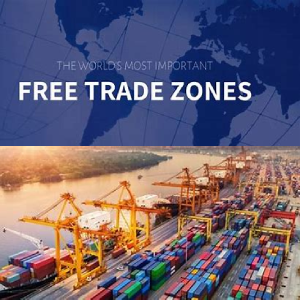
Originally conceived as a tool for fostering trade development, the concept of Free Trade Zones has
quickly become an effective means of promoting economic activities in general, and industrialization
in particular, especially in developing countries and crisis-ridden industrial areas. In line with this
logic, Cameroon has opted for a new strategy of industrialization and development by establishing a
Free Trade Zone regime. This regime was introduced by Ordinance No. 90/001 of January 29 th , 1990,
and subsequently incorporated into certain provisions of the General Tax Code. It defines a set of
advantageous measures for companies operating in Industrial Free Trade Zones. These measures
primarily consist of commercial, fiscal, and customs benefits, as well as administrative facilitations
granted to individuals and legal entities approved under the Free Trade Zone regime. This article
focuses on the fiscal and customs incentives provided by the aforementioned provisions. These
incentive measures, benefiting both domestic and foreign investors, have the potential to promote the
expansion of the Industrial Free Trade Zone and consequently, ensure optimal economic development
in general, and the activities of approved enterprises in particular. Hence, it is pertinent to ask what the
nature of these incentives is. To answer this question, we will analyse these incentives from the fiscal
(I) and customs (II) point of view.
I. Fiscal Incentives
Individuals or legal entities conducting their activities under the Free Trade Zone regime benefit from
a range of fiscal advantages, including tax exemptions and deductions, as stipulated by the January
29 th , 1990 Ordinance and the General Tax Code. With regard to exemptions, the first paragraph of
section 263 of the General Tax Code states that individuals and legal entities approved under the Free
Trade Zone regime are fully exempted from all current and future direct taxes and duties, as well as
stamp duties and registration fees of any kind, for the first ten years. From the eleventh year onwards,
the same exemptions remain in effect, except for the Industrial and commercial profits tax, which is
levied at a flat rate of 15%. It should be noted that in the event of changes to the assessment rules of
Industrial and commercial profits tax, the new provisions apply to approved enterprises only if they
are more favourable to them. Furthermore, approved enterprises are exempted from transfer duties on
any sale of real estate within the Free Trade Zone, as well as from any currency transfer tax on their
currency purchases or sales. As for tax deductions, the same paragraph reveals that the fiscal benefit
for approved enterprises is obtained after deducting 25% of the payroll paid to Cameroonian
employees during the fiscal year, as well as 25% of the investment expenses for that year. In addition,
approved enterprises are not required to reinvest the special asset revaluation reserve as prescribed by
laws and regulations in force. In the same vain, paragraph 2 of the aforementioned section specifies
that deficits incurred during the exemption period, are deducted from the profits of subsequent fiscal
years without any time limit. This attractive fiscal environment undoubtedly aims to stimulate
investments in Industrial Free Trade Zones. The same goes for customs benefits granted to enterprises
approved under this regime.
II. Customs Incentives
In addition to fiscal incentives, goods and equipment necessary for the activities of enterprises
approved under the Free Trade Zone benefit from customs advantages for importation, exportation,
and customs clearance. Indeed, a combined reading of Section 18 and subsequent articles of the
aforementioned January 29 th , 1990 Ordinance, as well as paragraphs 5 and 6 of Section 263 of the
General Tax Code, reveals that all Free Trade Zone enterprises are exempted from all current and
future customs duties and taxes. These advantages apply to both exports and imports, including
equipment, office furniture, office supplies, construction materials, tools, spare parts, raw materials,
intermediate products, supplies, and consumer goods. However, tourism cars and fuel entering the
Free Trade Zone are not covered by this exemption. It should also be noted that, value added tax
applies to exports at the rate of 0%. Furthermore, admitted enterprises are exempted from domestic
turnover tax, single tax, domestic production tax, and all other current and future taxes, duties, and
similar levies on the sale of raw materials, intermediate or finished products by local parties residing
in the national customs territory of an Industrial Free Trade Zone. Moreover, the buyer within the Free
Trade Zone pays for all articles, raw materials, equipment, or other products mentioned above in the
currency that is legal tender in Cameroon or any other convertible currency agreed upon by the buyer
and the seller. It is worth knowing that Free Trade Zone enterprises are not subject to the Import
Verification Program (IVP). As for customs clearance, custom services suspend the inspection of all
imports destined for the Free Trade Zone until these imports reach the intended Industrial Free Trade
Zone. These imports benefit from direct removal and are transferred under customs seals and escort.
In conclusion, the Free Trade Zone regime, as defined by the 1990 ordinance and the General Tax
Code, provides incentive measures to approved enterprises aimed at promoting investments and
facilitating exports. These measures include exemptions from customs duties and taxes on imports and
exports, as well as exemptions from registration fees. They also comprise of tax deductions and
absence of customs control and inspections on imports. By taking advantage of these incentives,
beneficiaries can enjoy a favourable environment to develop their activities, increase their
competitiveness, and contribute to the economic growth of Cameroon.
Author: Ngo Ntomb Elise Patricia Tax & Legal consultant; supervisor: Albert Désiré Zang, Managing
Partner
